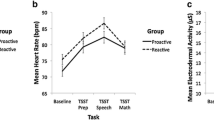Abstract
Experimenter effects have long been hypothesized to influence participants’ responses to mental stress testing. To explore the influence of experimenter warmth on responses to two mental stress tasks (mental arithmetic, mirror tracing), 32 young women participated in a single 45-min experimental session. Participants were randomized into warm experimenter or cold experimenter conditions that were operationalized using differential contact scripts, interpersonal styles, and attire. Heart rate (HR) and systolic and diastolic blood pressure (SBP and DBP) were measured during rest and task periods, and participants completed subjective ratings of anxiety and several items rating the experimenter. Results showed greater effort and improved performance on both tasks for participants in the warm experimenter condition, although no significant differences in HR, SBP, DBP, or subjective ratings of anxiety were observed between the conditions. These findings suggest that experimenter effects have a more robust influence on motivational factors than on physiologic or emotional response parameters.
Similar content being viewed by others
References
ABRAMSON, P. R., GOLDBERG, P. A., MOSHER, D. L., ABRAMSON, L. M., & GOTTESDIENER, M. (1975). Experimenter effects on responses to explicitly sexual stimuli. Journal of Research in Personality, 9, 136–146. doi:10.1016/0092-6566(75)90024-0
BARNES, M. L., & ROSENTHAL, R. (1985). Interpersonal effects of experimenter attractiveness, attire, and gender. Journal of Personality and Social Psychology, 48, 435–446. doi:10.1037/0022-3514.48.2.435
BINDER, A., MCCONNELL, D., & SJOHOLM, N. A. (1957). Verbal conditioning as a function of experimenter characteristics. Journal of Abnormal and Social Psychology, 55, 309–314. doi:10.1037/h0041612
BLASCOVICH, J., & KATKIN, E. S. (1993). Cardiovascular reactivity to psychological stress and disease. Washington, DC: American Psychological Association. doi:10.1037/10125-000
CHAPMAN, L. J., CHAPMAN, J. P., & BRELJE, T. (1969). Influence of the experimenter on pupillary dilation to sexually provocative pictures. Journal of Abnormal Psychology, 74, 396–400. doi:10.1037/h0027493
CIALDINI, R. B. (2009). Influence: Science and practice (5th ed.). New York: Pearson.
DAVIG, J. P., LARKIN, K. T., & GOODIE, J. L. (2000). Does cardiovascular reactivity to stress measured in the laboratory generalize to thesis and dissertation meetings among doctoral students. International Journal of Behavioral Medicine, 7, 216–235. doi:10.1207/S15327558IJBM0703_03
ELKINS, R. L. (1987). An experimenter effect on place avoidance learning of selectivelybred taste-aversion prone and resistant rats. Medical Science Research, 15, 1181–1182.
FRAZER, N. L., LARKIN, K. T., & GOODIE, J. L. (2002). Do behavioral responses mediate or moderate the relation between cardiovascular reactivity to stress and parental history of hypertension? Health Psychology, 21, 244–253. doi:10.1037//0278-6133.21.3.244
GLYNN, L. M., CHRISTENFELD, N., & GERIN, W. (1999). Gender, social support, and cardiovascular responses to stress. Psychosomatic Medicine, 61, 234–242.
JORGENSEN, R. S., & HOUSTON, B. K. (1981). Family history of hypertension, gender, and cardiovascular reactivity and stereotypy during stress. Journal of Behavioral Medicine, 4, 175–189.
HICKS, R. G. (1970). Experimenter effects on the physiological experiment. Psychophysiology, 7, 10–17. doi:10.1111/j.1469-8986.1970.tb02272.x
KRANTZ, D. S., & RATLIFF-CRAIN, J. (1989). The social context of stress and behavioral medicine research: Instructions, experimenter effects, and social interactions. In N. Schneiderman, S. M. Weiss, & P. G. Kaufmann (Eds.), Handbook of research methods in cardiovascular behavioral medicine (pp. 383–392). New York: Plenum.
LARKIN, K. T., CIANO-FEDEROFF, L. M., & HAMMEL, D. (1998). Effects of gender of observer and fear of negative evaluation on cardiovascular reactivity to mental stress in collegemen. International Journal of Psychophysiology, 29, 311–318. doi:10.1016/S0167-8760(98)00019-1
LUNDSTRÖM, J. N., & OLSSON, M. J. (2005). Subthreshold amounts of social odorant affect mood, but not behavior, in heterosexual women when tested by a male, but not a female, experimenter. Biological Psychology, 70, 197–204. doi:10.1016/j.biopsycho.2005.01.008
MANUCK, S. B., KASPROWICZ, A. L., MONROE, S. M., LARKIN, K. T., & KAPLAN, J. R. (1989). Psychophysiologic reactivity as a dimension of individual differences. In N. Schneiderman, S. M. Weiss, & P. G. Kaufmann (Eds.), Handbook of research methods in cardiovascular behavioral medicine (pp. 365–382). New York: Plenum.
MCGUIGAN, F. J. (1963). The experimenter: A neglected stimulus object. Psychological Bulletin, 60, 421–428. doi:10.1037/h0039936
ORNE, M. T. (1962). On the social psychology of the psychological experiment: With particular reference to demand characteristics and their implications. American Psychologist, 17, 776–783. doi:10.1037/1522-3736.5.1.535a
PAGE, S. (1971). Social interaction and experimenter effects in the verbal conditioning experiment. Canadian Journal of Psychology, 25, 463–475. doi:10.1037/h0082407
ROSENTHAL, R. (1966). Experimenter effects in behavioral research. New York: Appleton-Century-Crofts.
SILVERMAN, I. (1974). The experimenter: A (still) neglected stimulus object. Canadian Psychologist, 15, 258–270. doi:10.1037/h0081759
SULS, J., & GASTORF, J. (1980). Has the social psychology of the experiment influenced how research is conducted? European Journal of Social Psychology, 10, 291–294. doi:10.1002/ejsp.2420100306
TURNER, J. R. (1994). Cardiovascular reactivity and stress: Patterns of physiological response. New York: Plenum.
VON EIFF, A. W., PLOTZ, E. J., BECK, K. J., & CZERNIK, A. (1971). The effect of estrogen and progestins on blood pressure regulation of normotensive women. American Journal of Obstetrics and Gynecology, 109, 887–892.
WATT, C., & RAMAKERS, P. (2003). Experimenter effects with a remote facilitation of attention focusing task: A study with multiple believer and disbeliever experimenters. The Journal of Parapsychology, 67, 99–116.
WATT, C., & WISEMAN, R. (2002). Experimenter differences in cognitive correlates of paranormal belief and in psi. The Journal of Parapsychology, 66, 371–385.
WOLPE, J. (1958). Psychotherapy by reciprocal inhibition. Palo Alto, CA: Stanford University Press.
Author information
Authors and Affiliations
Corresponding author
Rights and permissions
About this article
Cite this article
Siegwarth, N., Larkin, K.T. & Kemmner, C. Experimenter Effects on Cardiovascular Reactivity and Task Performance During Mental Stress Testing. Psychol Rec 62, 69–82 (2012). https://doi.org/10.1007/BF03395787
Published:
Issue Date:
DOI: https://doi.org/10.1007/BF03395787




